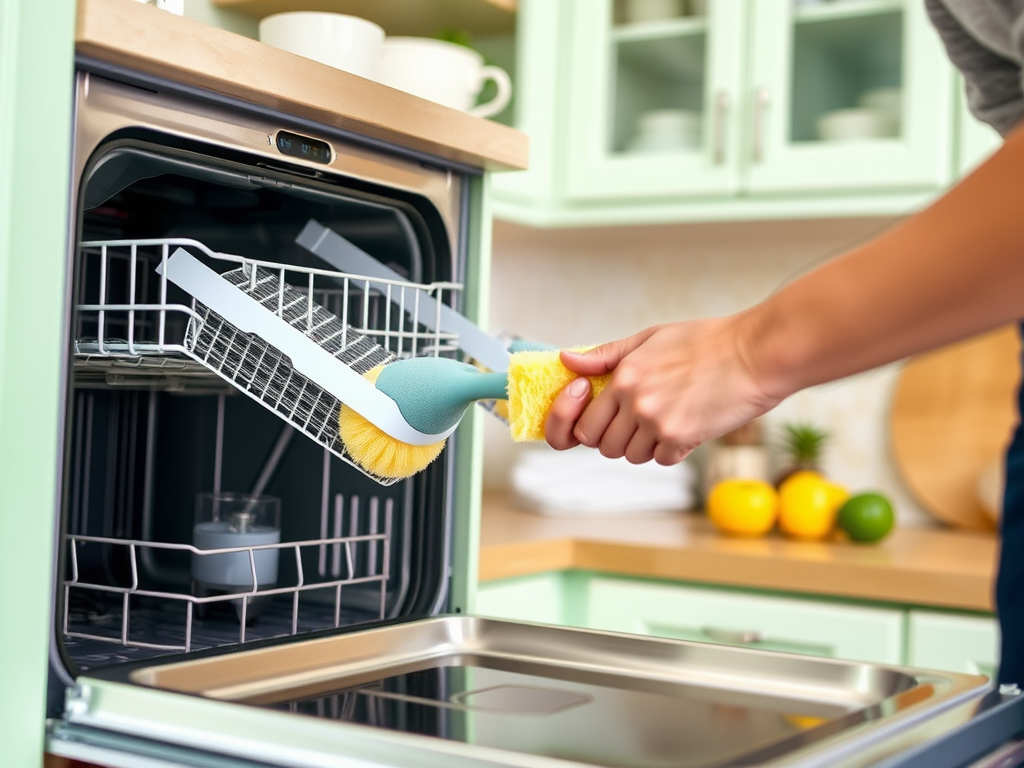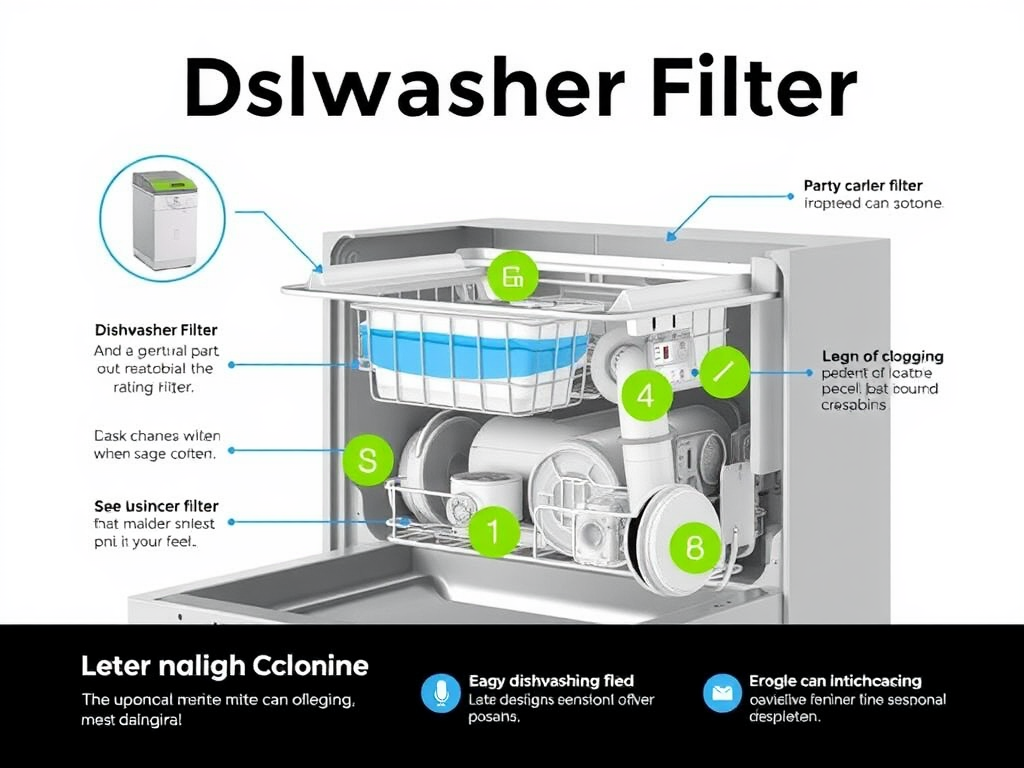If you’ve ever opened your dishwasher only to find dishes that still look dirty or to hear strange noises coming from the appliance, you may be facing a common yet frustrating issue: a clogged dishwasher filter. This problem can affect not just the cleanliness of your dishes but also the overall efficiency and lifespan of your dishwasher. Knowing how to identify and remove clogs from your dishwasher filter is crucial for maintaining optimal performance. By regularly examining this component, you can ensure that your dishwasher operates smoothly, saving both time and money on repairs. In this article, we will explore how to effectively identify these clogs and the steps to take for their removal, enabling you to keep your dishwasher in top shape.
Your dishwasher filter plays a vital role in its operation. However, over time, food particles, grease, and other debris can accumulate, leading to potential clogs that affect water flow and cleaning efficiency. Consequently, understanding your dishwasher filter and being able to quickly diagnose issues will not only extend the life of your appliance but also improve its performance. With a little knowledge and some simple maintenance, you can prevent these issues before they disrupt your routine. Let’s delve into the common signs of a clogged dishwasher filter and how to tackle the problem.
Understanding Your Dishwasher Filter

The dishwasher filter is essential for capturing food debris and preventing it from recirculating onto your dishes. The majority of dishwashers feature a filter system that sometimes can be disassembled for cleaning. While filters vary by model—from removable mesh to fixed types—they all serve the same primary function: ensuring that your dishes come out clean after a cycle. A dirty filter can hinder water flow, causing your dishwasher to work harder and ultimately decreasing its lifespan. Regular checks and cleaning will maintain not only the performance but also the efficiency of the appliance.
Common Signs of a Clogged Dishwasher Filter

Recognizing the signs of a clogged dishwasher filter is crucial for timely intervention. Knowing what to look for can help you address issues before they escalate. Below are some common indicators that your filter might be clogged:
- Poor Cleaning Performance: Dishes that come out dirty or with leftover food particles are primary signs of a problem.
- Unusual Noises: If your dishwasher is making strange sounds, it could indicate that debris is obstructing the water flow.
- Water Back-Up: Standing water at the bottom of your dishwasher after a cycle strongly suggests a clogged filter.
How to Access Your Dishwasher Filter
To start cleaning your dishwasher filter, it’s essential to access it properly. Different dishwasher models might have varying methods of getting to the filter, so it’s best to follow a general guideline while referring to your user manual for specifics. You typically need to remove the dish racks first, allowing you clearer access. Here’s a detailed approach:
- First, consult your dishwasher’s user manual to locate the filter’s exact position.
- Next, take out the lower dish rack for an easier view and access to the filter.
- Finally, remove the filter carefully, ensuring you don’t damage any components in the process.
Inspecting the Filter for Clogs
Once you’ve accessed the filter, the next step is to inspect it for any clogs. This inspection is a crucial part of the maintenance routine. Look for any residual food particles, grease, or grime that may have built up over time. A thorough inspection will help you determine the extent of the issue. Additionally, examine the filter for any signs of damage, such as cracks or breaks, which could also contribute to reduced efficiency. Regular inspections, even without visible signs of a problem, can preempt larger issues.
| Sign of Clog | Possible Cause | Action |
|---|---|---|
| Poor Cleaning Performance | Debris build-up in filter | Clean the filter |
| Standing Water | Blocked filter | Remove and clean |
| Unusual Noises | Object lodged in the filter | Inspect and clear |
Cleaning Your Dishwasher Filter
Cleaning your dishwasher filter is a straightforward process that can yield significant improvements in appliance performance. Starting with rinsing the filter under warm running water will effectively remove most debris. For stubborn particles, use a soft brush or sponge to gently scrub the surface, paying close attention to corners and small grooves. After ensuring the filter is spotless, reassemble it neatly back into its original position. Regular cleaning of the filter is recommended at least once a month to prevent clogging.
Regular Maintenance to Prevent Future Clogs
To reduce the frequency of clogs, implementing regular maintenance practices is key. Start by running your food disposal before using your dishwasher to eliminate any small particles that could make their way into the filter. Additionally, perform monthly inspections to check for build-up and clean as needed. Educating your household members about what items should not be placed in the dishwasher can further prevent issues. All in all, a few minutes of proactive care can save you from costly repairs down the line.
Conclusion
Identifying and removing clogs from your dishwasher filter is essential for maintaining an efficient and effective appliance. By following the outlined steps, you can ensure that your dishwasher runs optimally and prolong its lifespan. Regular maintenance not only enhances your dishwasher’s cleaning performance but also helps you avoid expensive repair bills.
Frequently Asked Questions
- How often should I clean my dishwasher filter? It is recommended to clean your dishwasher filter every month to prevent clogs and maintain performance.
- Can I run the dishwasher without a filter? No, running the dishwasher without a filter can lead to food debris clogging the drain and can compromise the appliance’s efficiency.
- What types of food can clog my dishwasher filter? Foods like rice, pasta, and grease are common culprits that can lead to filter clogs.
- Is it necessary to call a professional if I can’t remove the clog? If you’ve tried cleaning the filter and the clog persists, it may be wise to consult a professional service for further inspection and assistance.
- Are all dishwasher filters removable? Most modern dishwashers have removable filters, but some are not designed to be taken out. Always check your model’s manual for specifics.
